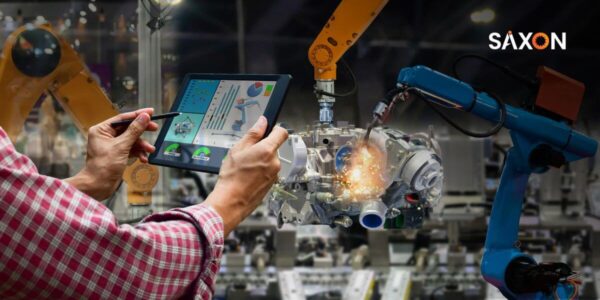The manufacturing industry has long relied on automation to improve productivity and efficiency. However, with the advent of artificial intelligence (AI), the potential for even more significant gains in these areas is now within reach. AI has made significant strides in the manufacturing industry in recent years. From automating repetitive tasks to optimizing production processes, AI has proven to be a valuable tool for manufacturers looking to increase efficiency and reduce costs. In this blog, we’ll explore the impact of AI in manufacturing industry and how it’s transforming it.
Industries are becoming increasingly intelligent through the widespread adoption of connected components, smart sensors, and robotic automation, among other technologies. The advent of Industry 4.0 has had a profound influence on the manufacturing sector. Characterized by a high degree of automation and the exchange of vast amounts of data between machines and manufacturing technologies, Industry 4.0 requires cognitive and autonomous solutions to manage the entire production process. This entails using AI-based, data-driven models for customized manufacturing decisions, predictions, and real-time optimization, thereby transforming the manufacturing landscape.
Many industries are investing more in building intelligent factories to improve production. AI in the manufacturing industry offers cost savings on labor, reduced unplanned downtime, fewer product defects, and increased production speed and accuracy. As awareness of Industry 4.0 grows, the adoption of AI in manufacturing will continue to rise. Microsoft reports that 15% of businesses already use AI, and 31% plan to implement intelligent systems. This significant technological advancement of Industry 4.0 has created a higher demand for AI in the manufacturing market. Let’s get into details.
Automation with AI:
One of the primary ways you can use AI in manufacturing is through robotic automation. Traditional robots are pre-programmed to perform specific tasks, but AI-powered robots can adapt and learn on the fly. This allows them to perform a broader range of tasks and handle unexpected situations more effectively.
For example, an AI-powered robot might be tasked with assembling a product. As it performs the task, it uses sensors and other data inputs to identify variations in the expected outcome. If it detects that a part is not fitting correctly, it can adjust its movements and try a different approach until it completes the task. In addition to their ability to adapt and learn, AI-powered robots can work around the clock without needing breaks. This allows for continuous production, significantly increasing a manufacturer’s output. According to a recent National Association of Manufacturers survey, 77% of manufacturers currently use robotics in their operations, and an additional 17% plan to implement them soon. This indicates a strong trend toward the adoption of AI-powered robots in manufacturing.
Predictive Maintenance:
AI in manufacturing for predictive maintenance is becoming increasingly popular in the manufacturing industry. An Electrical and Electronics Engineers survey found that 82% of manufacturers use or plan to use AI for predictive maintenance. This indicates a strong trend toward adopting this technology in the industry.
Traditional maintenance techniques rely on scheduled downtime for equipment, which can be costly and disrupt production. However, with AI, manufacturers can detect potential issues with the equipment before they become significant problems. AI algorithms can analyze data from sensors and other sources to identify patterns and trends that indicate a potential problem. For example, a machine might vibrate more than usual, indicating an issue with one of its parts. By detecting this early on, manufacturers can take preventative action and avoid costly downtime.
Optimizing Production Processes:
In addition to automating tasks and improving maintenance, AI can optimize production processes. Through machine learning algorithms, manufacturers can analyze data from their operations and identify ways to improve efficiency.
For example, AI can help identify bottlenecks in the production line and suggest changes to improve throughput. It can also analyze data from customer orders and make recommendations for production scheduling to ensure that you deliver products on time. A recent survey by McKinsey found that 70% of manufacturers use or plan to use AI for process optimization. This indicates that many manufacturers are seeing the value of AI in this area and are looking to implement it in their operations.
Benefits of AI in Manufacturing:
The use of artificial intelligence (AI) in the manufacturing industry has the potential to provide numerous benefits. Some of the critical advantages of AI in manufacturing include the following:
- Reduced labor costs: By automating specific tasks, AI systems can help manufacturers reduce labor costs. According to a National Association of Manufacturers survey, 33% of manufacturers reported reducing their labor costs through AI and other technologies.
- Reduced unplanned downtimes: AI systems can monitor production processes in real time and identify potential problems before they occur. This can help manufacturers avoid costly disruptions and maintain a consistent production level. According to a report from McKinsey & Company, AI-based predictive maintenance systems can reduce unplanned downtime by up to 50%.
- Fewer product defects: AI systems can analyze data to identify patterns and trends that might indicate a potential issue with a product. This can help manufacturers take corrective action before a defective product reaches the customer, improving the overall quality of their products. A study found that AI-based quality control systems can reduce product defects by up to 50%.
- Increased production speed: By automating specific tasks, AI systems can help manufacturers reduce the time it takes to produce a product, allowing them to meet customer demand more quickly and efficiently. A National Association of Manufacturers survey found that 39% of manufacturers reported increased production speed through AI and other technologies.
- Improved decision-making: AI systems can analyze data from production processes to provide insights and recommendations that would be difficult or impossible for humans to identify. This can help manufacturers optimize their operations, reduce waste, and improve the overall efficiency of their production processes. A survey by the Manufacturing Institute found that AI-based decision-support systems can improve manufacturing efficiency by up to 20%.
Takeaway:
AI has the potential to significantly impact the manufacturing industry by improving efficiency, reducing costs, and increasing product quality. While there are still challenges to overcome, such as the integration of AI technology into existing systems and the need for specialized expertise, the potential benefits of AI in manufacturing are significant and likely to drive its continued adoption in the coming years.
Do you wish to bring some automation flavor into your system? Then, we can help.
Check out Saxon’s solutions.
















